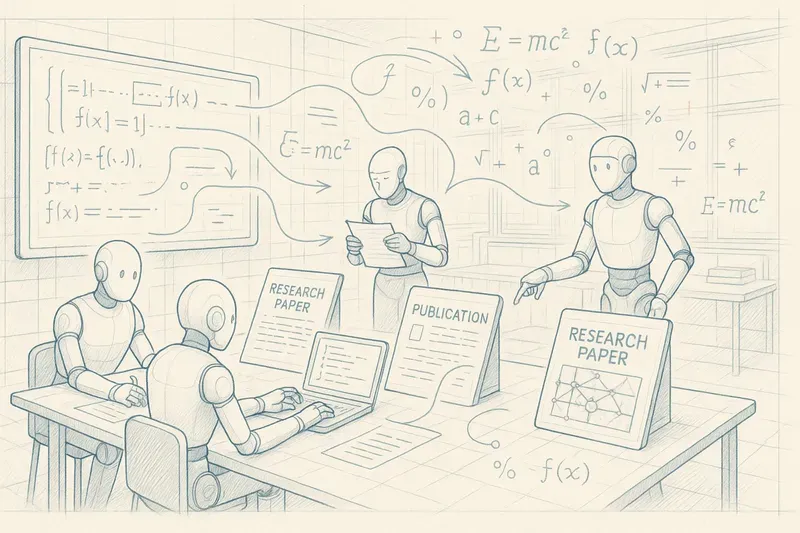
Here are the top 5 most relevant AI papers from arXiv week 30/2025, complete with analysis and insights.
Publications at a Glance
Multi-Agent Collaboration Mechanisms: A Survey of LLMs Khanh-Tung Tran, Dung Dao, Minh-Duong Nguyen, Quoc-Viet Pham, Barry O'Sullivan, Hoang D. Nguyen | 1/10/2025
AlgoPilot: Fully Autonomous Program Synthesis Without Human-Written Programs Xiaoxin Yin | 1/11/2025
ChartCoder: Advancing Multimodal Large Language Model for Chart-to-Code Generation Xuanle Zhao, Xianzhen Luo, Qi Shi, Chi Chen, Shuo Wang, Zhiyuan Liu, Maosong Sun | 1/11/2025
Guided Code Generation with LLMs: A Multi-Agent Framework for Complex Code Tasks Amr Almorsi, Mohanned Ahmed, Walid Gomaa | 1/11/2025
Beyond Text: Implementing Multimodal Large Language Model-Powered Multi-Agent Systems Using a No-Code Platform
Key Insights
This research introduces a No-Code platform for developing multimodal Large Language Model (LLM)-powered Multi-Agent Systems, significantly reducing the technical barriers to AI adoption in enterprises. It innovatively validates the practicality of AI applications across various business processes, showcasing the potential for users without programming skills to effectively utilize advanced AI technologies.
Potential Impact
By making AI accessible to a broader audience, this approach could transform how organizations integrate and leverage AI solutions, enhancing productivity and efficiency across diverse industries. The democratization of AI technologies has the potential to accelerate innovation and adoption, fundamentally changing the landscape of enterprise operations and decision-making.
Multi-Agent Collaboration Mechanisms: A Survey of LLMs
Key Insights
This research presents a comprehensive survey of Multi-Agent Systems (MASs) utilizing Large Language Models (LLMs), highlighting new collaboration-centric approaches that enhance the capabilities of AI agents in solving complex tasks. It introduces an innovative framework for categorizing collaboration mechanisms, which can inform and guide future developments in this rapidly evolving field.
Potential Impact
By advancing the understanding and application of collaborative LLM-based agents, this work has the potential to revolutionize various domains such as telecommunications, industry, and social interactions, leading to more efficient and intelligent solutions. The findings may encourage broader adoption of MASs, ultimately contributing to the emergence of artificial collective intelligence in real-world scenarios.
AlgoPilot: Fully Autonomous Program Synthesis Without Human-Written Programs
Key Insights
AlgoPilot represents a significant advancement in program synthesis by completely eliminating the need for human-written programs or prior knowledge, utilizing a novel reinforcement learning approach guided by a Trajectory Language Model. This innovative method enables the generation of reusable algorithms from scratch, expanding the possibilities for automated algorithm discovery.
Potential Impact
The introduction of AlgoPilot could revolutionize the field of program synthesis by enabling fully autonomous generation of algorithms, which may lead to faster and more efficient software development processes. This advancement has the potential to transform applications across various domains, allowing for the creation of complex algorithms without human intervention and fostering new capabilities in artificial intelligence and machine learning.
ChartCoder: Advancing Multimodal Large Language Model for Chart-to-Code Generation
Key Insights
ChartCoder introduces a novel approach to chart-to-code generation by utilizing Code LLMs to improve the executability and fidelity of the resulting code, addressing significant limitations in current multimodal large language models. Additionally, the creation of the Chart2Code-160k dataset and the Snippet-of-Thought method represent innovative contributions to enhancing the training process for these tasks.
Potential Impact
This research has the potential to revolutionize how charts are interpreted and translated into executable code, minimizing information loss and enhancing the accuracy of generated representations. By providing a robust framework and dataset for chart-to-code generation, it could facilitate a wide range of applications in data visualization, software development, and automated programming, ultimately streamlining workflows in these fields.
Guided Code Generation with LLMs: A Multi-Agent Framework for Complex Code Tasks
Key Insights
This research introduces a multi-agent framework for guided code generation, addressing the limitations of large language models in handling complex programming tasks and compositional reasoning. By employing a structured approach, the framework significantly improves code generation accuracy, as evidenced by a 23.79% enhancement in solution accuracy on the HumanEval benchmark.
Potential Impact
The proposed framework could transform the way software development is approached, allowing developers to leverage LLMs more effectively for complex coding tasks. This innovation may lead to more reliable automated coding tools and enhance productivity by streamlining the process of generating accurate code solutions.
 AiBrain
AiBrain